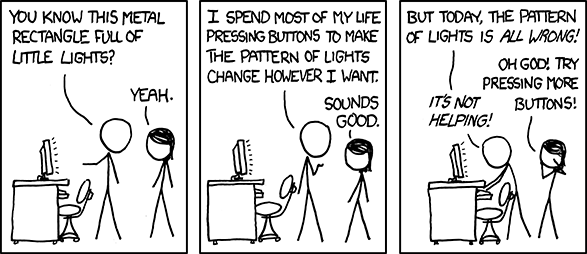Ullman’s Game of Dead Programmers
I really, really didn’t like reading The Bug. I thought Ullman’s prose was gross, her characters unlikable, and her story a melodramatic heap of pointless computer-related tragedy. As a logic-driven person who doesn’t like to find meaning where there doesn’t need to be any, I tend to have difficulties dealing with a story that people tell me is deep and insightful while I’m wondering if the fun-to-read part of the book is hiding in the last two pages. So in lieu of writing about literary meaning that I know I’d be making up as I go, I’m going to complain about Ethan.
Ethan is a great example of a typical programmer.
Just kidding. Ethan is a great example of a sociopath who really shouldn’t be in computing.
Take a look at this comic by XKCD’s Randall Munroe:
I’m pretty sure that this is what an explanation of programming sounds like to someone whose mind isn’t naturally wired up in the weird way that makes code make sense. It’s also reminiscent of every time that Ethan blurts out the rules to his fake simulation of life. Ethan is great with rules. Rules are what turned him to the mind-destroying life of a computer programmer (what? It obviously destroyed his). Rules are what he’s certain govern life, the universe, everything.
Ethan’s “pattern of lights” during the entirety of his pitiful life was always all wrong to him: his creatures never lived, as he wanted them to; they only followed his rules. Then, suddenly, he added a rule that adjusted just enough numbers to make his creatures act a little bit more real. And then he’s furious, because there’s no underlying meaning, feeling, or emotion behind his pixels’ new family-like activity.
Then Ethan finally does us all a favor and dies so we can go back to Roberta’s somewhat more competent perspective.
My point is that Ethan was always hunting for fairies and demons – the little bits of magic that made the world work (or make the computer crash), hiding behind seemingly straightforward rules and code. A dangerous mistake, in a world where computers are distinctly non-magical.
His impression of the eponymous bug, even shortly after its birth, was of a hidden demon that lived in the code, taunting him. The truth? It was a dumb little mistake from someone whose code he logically would have wanted to find as much trouble with as he could; an error that could have been found in much less than a year if Ethan had actually considered what would make his system explode when the mouse was involved.
Maybe he could have, I guess, but he gave the bug a personality and let it kill him after a long series of pressing buttons in a panic and not actually stopping to actually think (contrary to when he thought he was thinking). He wasn’t cut out for the dangerous world of computer science.
